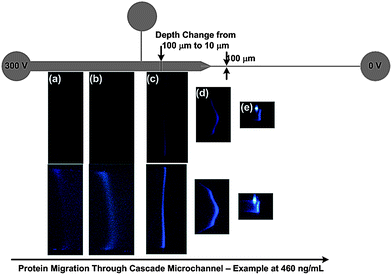 Cardiac troponin I (cTnI) occurs only in heart muscle, making it an excellent biomarker for diagnosing damage to heart tissue as a result of a heart attack, for example. Recent work has indicated that the phosphorylation state of cTnI is a more accurate indicator of heart muscle health than the total cTnI concentration – which is used in current assays.
Cardiac troponin I (cTnI) occurs only in heart muscle, making it an excellent biomarker for diagnosing damage to heart tissue as a result of a heart attack, for example. Recent work has indicated that the phosphorylation state of cTnI is a more accurate indicator of heart muscle health than the total cTnI concentration – which is used in current assays.
In this hot paper Cornelius F. Ivory and colleagues at Washington State University have used cationic isotachophoresis to preconcentrate samples of cTnI spiked blood samples at clinically relevant concentrations in a cascade microchip. Preconcentration allows detection of concentrations as low as 46 ng mL-1, and the method is able to quantitatively differentiate between phosphorylated and unphosphorylated cTnI.
To read more on the design of the chip and its potential for use in clinical settings download the article – it’s free to access for 4 weeks following a simple registration:
Preconcentration and detection of the phosphorylated forms of cardiac troponin I in a cascade microchip by cationic isotachophoresis
Danny Bottenus, Mohammad Robiul Hossan, Yexin Ouyang, Wen-Ji Dong, Prashanta Dutta and Cornelius F. Ivory
Lab Chip, 2011, Advance Article
DOI: 10.1039/C1LC20469F










